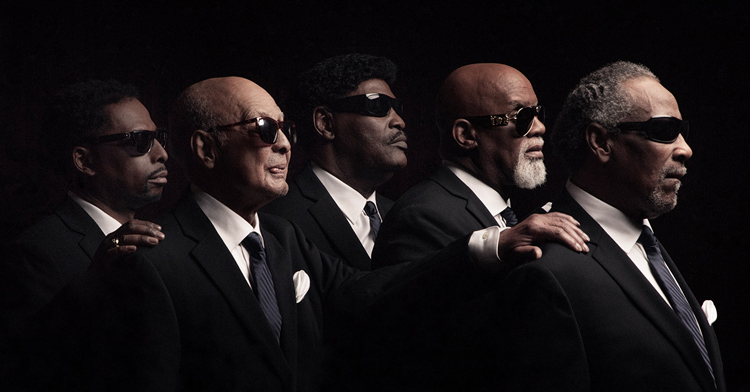In terms of longevity, the Blind Boys of Alabama have set a high water mark for music making that’s unlikely to be matched. To put their astonishing record into historical perspective, in the eight decades since this now venerated gospel group first started singing together, America has participated in a world war, finalised the creation of the atomic bomb, put men on the moon and witnessed the arrival of the worldwide web.
During the 1960s, the band was part of the soundtrack to the Civil Rights movement, singing at benefits for Martin Luther King. They’ve played for three presidents: Bill Clinton, George Bush and Barack Obama.
Eric “Ricky” McKinnie has been associated with The Boys for more than 40 years, since 1987 as a fully-fledged member, singing, drumming and narrating and happily acting as a media spokesperson for the enduring collective, whose sublime four-part vocal harmony has seduced all denominations and demographics around the world.
The Boys’ group leader and elder statesman, sole surviving founder member Jimmy Carter, is well into his eighties now but still going strong. Others in the touring group — fellow blind singers, baritone Ben Moore and soprano Paul Beasley, and guitarist/musical director Joey Williams — are spring chickens by comparison.
McKinnie, who lost his sight to glaucoma in 1975 at the age of 23, insists their disability is no handicap: As he asserts: “It’s not about what you can’t do; it’s about what you do. And what we do is sing good gospel music.” He enjoys unique status as the only nationally known blind drummer in the US. “I don’t think my drummin’ changed after I lost my sight; I think people’s perception of who I was changed. I’ve always had the ability. I’ve used my ears to be more focused on what’s happenin’ around me. So many people become visually distracted by what’s going on around them that they don’t listen.”
The Blind Boys of Alabama have five Grammy Awards to their credit, including a Lifetime Achievement Award, and have recorded more than 60 albums. “I’d have to say that getting’ the Achievement Award at the Grammies was our finest moment,” says McKinnie. “That award let us know that it was all worthwhile,” he emphasises, adding with a chuckle: “Most of the previous recipients of that award have stopped travellin’ or they’re too old to really appreciate it.”
Commenting on the group’s astonishing staying power and sustained popularity, he points to consistency in personnel over the years: “We’ve only had about half-a-dozen changes”.
Of all the songs that The Boys have covered in their career, McKinnie singles out ‘Amazing Grace’ and ‘God Said It (That’s Good Enough For Me)’ as personal favourites. Another set-list staple is Curtis Mayfield’s ‘People Get Ready’, which in the Blind Boys‘ rendition becomes a fervent prayer for salvation. Stevie Wonder’s ‘Higher Ground’ and Norman Greenbaum’s ‘Spirit In The Sky’ are other pop songs that benefit from their deep gospel approach. Traditional works such as ‘Down by the Riverside’, ‘Swing Low, Sweet Chariot’, ‘Go Tell It On The Mountain’, ‘Take Me To The Water’ and the civil rights anthem ‘I Shall Not Be Moved’ are also mainstays in the repertoire.
Spirituality and simplicity are the prime criteria in the selection of new material, McKinnie indicates. “Every song we do tells a story that people can relate to,” he stresses. “They’re songs that are easily understood and that touch hearts. We don’t have a problem with doin’ any kind of song — and we’ve been doing secular songs for a long time — because what we sing is from the heart and reaches the heart. People who come to our shows always have a good time, and if they come sad they’ll go away happy. We always have a good time, because we really enjoy what we’re doing.”
While the Blind Boys have worked with an impressively diverse array of stellar guests on records and on stage, Ricky says they don’t actively seek them out. “We don’t try to pick anybody. We’re here; our door’s always open. All you’ve gotta do is knock, and if you’ve got somethin’ that we like and can come together then we’ll do it.”
Among the many famous artists that The Boys have recorded or worked with in a career that has seen them cross multiple musical boundaries, McKinnie singles out Ben Harper, Dr John, Tom Petty, Aaron Neville and Peter Gabriel. However, they’ve also collaborated with legends like Prince, Tom Waits, Willie Nelson, Lou Reed, Mavis Staples and George Clinton.
While they’ve been in existence for eighty-odd years, the Blind Boys Of Alabama show no signs of slowing down — as 150 shows last year, including a tour of Europe with blind West African duo Amadou & Mariam — and a tour of Australia in March of this year might indicate.
The $64,000 question now is: will they be able to keep going long enough to pass the centenary milestone? “I reckon we will,” says McKinnie, who seems confident that new members will always emerge to extend the group’s imposing record. “We keep our ears open for fresh talent; we try to find people that think like we do.”
The term “living legends” is lobbed around with impunity by glib music commentators. With the Blind Boys of Alabama, however, use of the alliterative catchline is nigh obligatory. Mind you they acknowledge some assistance from ‘on high’.
“I believe the band has been chosen to do what we do,” says Eric “Ricky” McKinnie, adding, “and when God shows favour, things work out for ya. We’ve been prayin’ for a long time and just believin’ that things do work out. We do what we have to do to keep the music goin’ and do the best concerts that we can.”
• The above interview first appeared in Rhythms, Australia’s only dedicated roots music magazine.


